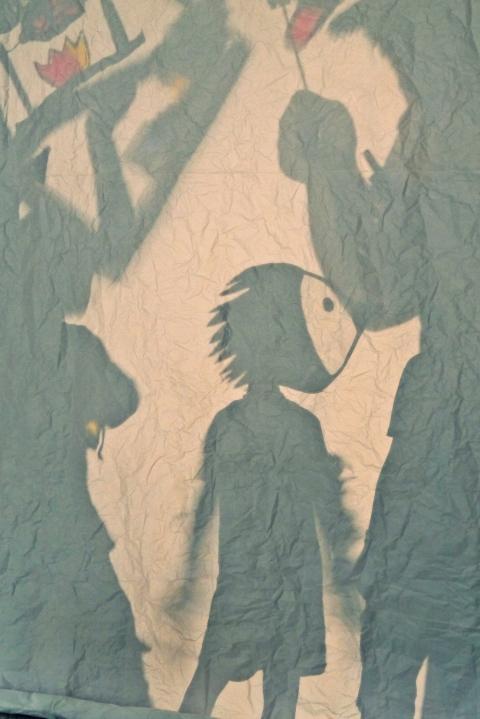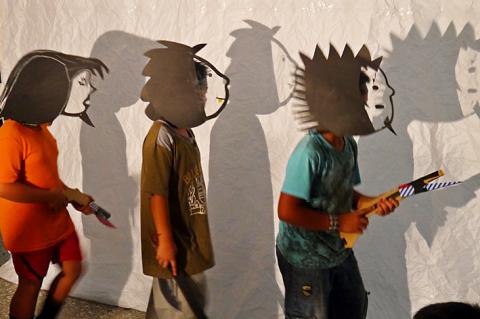On a wet Friday afternoon last week, Gufeng Primary School (古風國小), which is hidden away off the National Highway No. 9 in Zhuoxi Township (卓溪鄉), southern Hualien, was the scene of a small theatrical production. In final rehearsals, Robin Ruizendaal, artistic director of the Taiyuan Puppet Theatre Company (台原偶戲團), was roaring like the Formosan Black Bear, much to the delight of the performers — primary school students from the Bunun aboriginal people (布農族). The show was a small 10-minute playlet put together by the Taiyuan Puppet Theatre Company with the help of staff and students of Gufeng Primary School. The small turnout was expected, as Ruizendaal explained that the project had intentionally been kept low-profile. “We didn’t want to make this a showcase, a promotional thing for Taiyuan. I want it really to be for the people, and after it’s done, we just get the hell out of here. … I don’t want to be a missionary or anything, but I hope that they can have more pride in their own culture and use different ways, other than just song and dance, to promote their own culture.”
The production, about a hunter who loses his beloved hunting dog in the wilderness and subsequently turns into a bird, was performed and sung by the students. All the props were made on site by students with the help of staffers from Taiyuan, who were also on hand to make any repairs caused by over-exuberance. A simple cutout of a mountain pig got torn apart during rehearsals, but was quickly stuck back together, and the show went on.
Although the audience was small, the participating students were having a great time with this unusual experiment in education, and the production process and performance were being recorded by a documentary film team, as well as by Taiyuan members themselves. “Of course they prefer this, it’s much more exciting than classes,” said one teacher.

Photo courtesy of Taiyuan Puppet Theatre Company
This is the second year that Taiyuan has conducted this project of bringing simple puppet theater to the aboriginal community and working together with local people to create shows that particularly target locals, rather than putting aboriginal culture on show for tourists. This year, with the support of UNESCO, they will also venture into some more remote communities whose language has been assessed as being at risk, using the shows to reinforce the importance of traditional language and culture.
Scripts of six plays from last year’s project will be released as a book so that similar plays might be performed in other schools and children, regardless of ethnic background, can learn about Taiwan’s aboriginal heritage.
“Ok, I am now going to read in the mother tongue (母語),” said one of the teachers helping to manage the kids backstage and assisting as a narrator during rehearsals. “You mustn’t laugh.” A native speaker of Mandarin in an aboriginal school, she struggled with her pronunciation. But according to Director of Student Affairs Su Yuan-mei (蘇元媚), the students’ grasp of their mother tongue was not that great either, as they had little opportunity to practice. “We only have one class a week in their mother tongue,” she said, “And many of them don’t speak it even at home, since so much of what they are exposed to, like TV, is in Chinese.” Although the language of this Bunun community is not currently at risk, limited exposure and use among the younger generation could place it in danger in the future.

Photo courtesy of Taiyuan Puppet Theatre Company
Ruizendaal emphasized the interactive aspect of the production as something quite distinct from what Taiyuan had done in the past.
“We have done thousands of shows in Taiwan and abroad as well, but there was so much about Taiwan that we still didn’t know. There are an amazing number of stories out there. But the idea of going to study these stories ourselves and then performing it was not nearly as interesting as going to the tribe and asking them for the story, writing it into a simple play and giving it back to them, so that they could do the performance with their own people… We are just in a producing role, but at the same time, we also learn an amazing amount about Taiwan.”
This style of production, with Taiyuan providing support for aboriginal communities, has generated considerable interest. The project, titled Taiwan’s Disappeared! Touch Taiwan Shadow Puppet Tour (台灣不見了!Touch Taiwan光影課程巡迴計畫),is supported by the Council of Indigenous Peoples (原住民委員會), and now in its second year, is reaching deeper into Taiwan’s aboriginal community.
On the face of it, the productions are simple enough. The requirements are a projector, a screen, a couple of set designers, directors and administration staff from Taiyuan, and most importantly, the willingness of the communities to participate and delve into their own heritage. “This is a really valuable opportunity for the children,” Su said. “The children have a chance to participate in a theatrical enterprise and also become more familiar with their own culture. There is really not enough opportunity in the regular curriculum for this.”
A projector and screen are left with each school or community that participates in the project with the hope that similar projects can continue, driven from within the community itself. For Taiyuan, it is an opportunity to discover new riches in Taiwan. “The main thing for ourselves is visiting all these places and working together with the communities at this super grassroots level. You discover the amazing richness of aboriginal culture in Taiwan, which is mostly hidden from view for people living in the big cities.”

This is the year that the demographic crisis will begin to impact people’s lives. This will create pressures on treatment and hiring of foreigners. Regardless of whatever technological breakthroughs happen, the real value will come from digesting and productively applying existing technologies in new and creative ways. INTRODUCING BASIC SERVICES BREAKDOWNS At some point soon, we will begin to witness a breakdown in basic services. Initially, it will be limited and sporadic, but the frequency and newsworthiness of the incidents will only continue to accelerate dramatically in the coming years. Here in central Taiwan, many basic services are severely understaffed, and

Jan. 5 to Jan. 11 Of the more than 3,000km of sugar railway that once criss-crossed central and southern Taiwan, just 16.1km remain in operation today. By the time Dafydd Fell began photographing the network in earnest in 1994, it was already well past its heyday. The system had been significantly cut back, leaving behind abandoned stations, rusting rolling stock and crumbling facilities. This reduction continued during the five years of his documentation, adding urgency to his task. As passenger services had already ceased by then, Fell had to wait for the sugarcane harvest season each year, which typically ran from

It’s a good thing that 2025 is over. Yes, I fully expect we will look back on the year with nostalgia, once we have experienced this year and 2027. Traditionally at New Years much discourse is devoted to discussing what happened the previous year. Let’s have a look at what didn’t happen. Many bad things did not happen. The People’s Republic of China (PRC) did not attack Taiwan. We didn’t have a massive, destructive earthquake or drought. We didn’t have a major human pandemic. No widespread unemployment or other destructive social events. Nothing serious was done about Taiwan’s swelling birth rate catastrophe.

Words of the Year are not just interesting, they are telling. They are language and attitude barometers that measure what a country sees as important. The trending vocabulary around AI last year reveals a stark divergence in what each society notices and responds to the technological shift. For the Anglosphere it’s fatigue. For China it’s ambition. For Taiwan, it’s pragmatic vigilance. In Taiwan’s annual “representative character” vote, “recall” (罷) took the top spot with over 15,000 votes, followed closely by “scam” (詐). While “recall” speaks to the island’s partisan deadlock — a year defined by legislative recall campaigns and a public exhausted